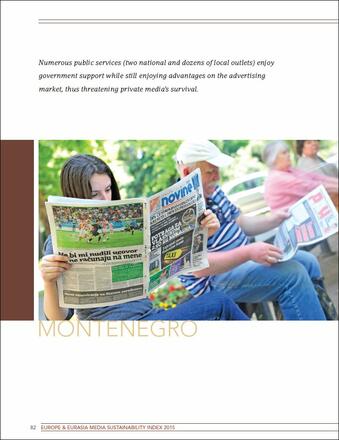
Montenegro IREX 2015
Negative trends persist in the media landscape of Montenegro. Polarization has been noted also in the media sector, with media in line with the ruling party, i.e. DPS (such as Pobjeda, Montenegrin Radio, and TV-RTCG) which openly clashed with the most influential private print media (Vijesti and Dan), particularly on the issue of local elections.
The last state-owned print media company, Pobjeda, went bankrupt despite constant financial support from the government, leaving 200 employees jobless.
The media community is still highly politicized, prone to internal conflicts, and lacking solidarity to address threats to freedom of speech. Furthermore, the media still suffer from a lack of professionalism, displayed in tendentious editorial policies, hate speech, and poor protection of personal data.
Five different objectives are assessed in this report:
- freedom of speech;
- professional journalism;
- plurality of news sources;
- business management;
- supporting institutions;
With the exception of the first objective, “Free speech”, all other parameters considered by IREX have recorded a stable record in the period 2010-2015.
Comparative data are provided for each indicator in the time span considered by the report (2010-2015). The overall performance of the country is confronted with the developments registered in the other countries of the region. Since 2014, the has been no significant change in the overall situation of media sustainability in Montenegro.
The Media Sustainability Index (MSI) is a product of IREX with funding from USAID.
Tags: Montenegro Ethics of journalism Media pluralism Media Law Legal protectionThe content of this article can be used according to the terms of Creative Commons: Attribution-NonCommercial 4.0 International (CC BY-NC 4.0) . To do so use the the wording "this article was originally published on the Resource Centre on Media Freedom in Europe" including a direct active link to the original article page.

